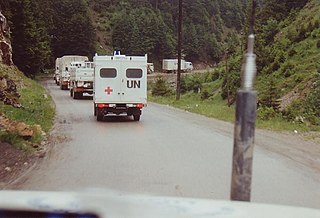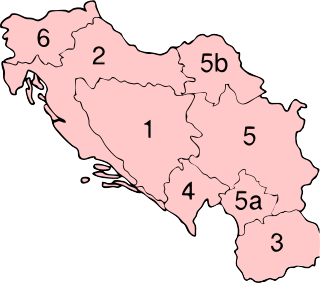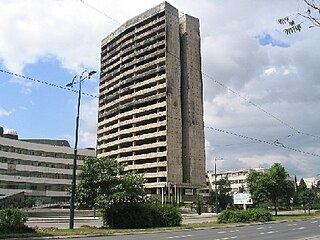
Operation Sky Monitor was a NATO mission to monitor unauthorized flights in the airspace of Bosnia and Herzegovina during the Bosnian War. The operation began in response to United Nations Security Council Resolution 781, which established a ban on the use of military aircraft in Bosnian airspace, and requested the aid of member states in monitoring compliance. Beginning on October 16, 1992, NATO monitored violations of the no-fly zone using E-3 Sentry NAEW aircraft based in Germany, Italy, Greece, and the United Kingdom. The operation documented more than 500 violations of the no-fly zone by April 1993. In response to this high volume of unauthorized flights, the Security Council passed Resolution 816, which authorized NATO to enforce the no-fly zone, and engage violators. In response, NATO deactivated Sky Monitor on April 12, 1993, transferring its forces to the newly established Operation Deny Flight.

The NATO intervention in Bosnia and Herzegovina was a series of actions undertaken by NATO whose stated aim was to establish long-term peace during and after the Bosnian War. NATO's intervention began as largely political and symbolic, but gradually expanded to include large-scale air operations and the deployment of approximately 60,000 soldiers of the Implementation Force.
United Nations Security Council resolution 749, adopted unanimously on 7 April 1992, after reaffirming resolutions 713 (1991), 721 (1991), 724 (1991), 727 (1992), 740 (1992) and 743 (1992), the Council approved of a report by the Secretary-General Boutros Boutros-Ghali and decided to authorise the earliest possible deployment of the United Nations Protection Force (UNPROFOR) in the former Yugoslavia.

United Nations Security Council resolution 786, adopted unanimously on 10 November 1992, after reaffirming Resolution 781 (1992), the Council approved a recommendation by the Secretary-General Boutros Boutros-Ghali to increase the strength of the United Nations Protection Force (UNPROFOR) in Bosnia and Herzegovina by 75 observers to monitor the ban on military flights over the country.

United Nations Security Council resolution 787, adopted on 16 November 1992, after reaffirming Resolution 713 (1991) and all subsequent resolutions on the topic, the council called upon the parties in Bosnia and Herzegovina to consider the draft outline constitution as a basis for negotiating a political settlement of the conflict in the country, and went on to impose further international sanctions on the Federal Republic of Yugoslavia.

United Nations Security Council resolution 807, adopted unanimously on 19 February 1993, after reaffirming Resolution 743 (1992) and all subsequent relevant resolutions concerning the United Nations Protection Force (UNPROFOR), the Council determined that the situation in Bosnia and Herzegovina and Croatia continued to constitute a threat to international peace and security and therefore extended the mandate of UNPROFOR for an interim period ending 31 March 1993.

United Nations Security Council resolution 816, adopted on 31 March 1993, after reaffirming resolutions 781 (1992), 786 (1992) concerning a ban on military flights over Bosnia and Herzegovina and recognising the current situation in the region, the council, acting under Chapter VII of the United Nations Charter, extended the ban to cover flights by all fixed-wing and rotary-wing aircraft over the country, and to use all measures necessary to ensure compliance with the ban.

United Nations Security Council resolution 820, adopted on 17 April 1993, after reaffirming all previous resolutions on the topic for a lasting peace settlement in Bosnia and Herzegovina and the region, the council discussed the peace plan for Bosnia and Herzegovina and comprehensive steps to ensure its implementation.

United Nations Security Council resolution 824, adopted unanimously on 6 May 1993, after considering a report by the Secretary-General Boutros Boutros-Ghali pursuant to Resolution 819 (1993), the council discussed the treatment of certain towns and surroundings as "safe areas" in Bosnia and Herzegovina.

United Nations Security Council resolution 836 was adopted on 4 June 1993. After reaffirming Resolution 713 (1991) and all subsequent resolutions on the situation in the former Yugoslavia, the Council expressed its alarm at the continuing situation in Bosnia and Herzegovina and decided to expand the mandate of the United Nations Protection Force (UNPROFOR) by allowing it to use force to protect the "safe areas".

United Nations Security Council resolution 847, adopted unanimously on 30 June 1993, after reaffirming Resolution 743 (1992) and subsequent resolutions relating to the United Nations Protection Force (UNPROFOR), the council condemned military attacks in Croatia and Bosnia and Herzegovina and extended the mandate of UNPROFOR until 30 September 1993.

United Nations Security Council resolution 859, adopted unanimously on 24 August 1993, after recalling all resolutions on the situation in Bosnia and Herzegovina, the council noted that, despite all previous security council resolutions since Resolution 713 (1991), the region was still a scene of hostilities and there was little compliance with previous resolutions, particularly by the Bosnian Serb party.

United Nations Security Council resolution 871, adopted unanimously on 4 October 1993, after reaffirming resolutions 713 (1992) and 743 (1992) and subsequent resolutions relating to the situation in the former Yugoslavia and United Nations Protection Force (UNPROFOR), the Council expressed concern that United Nations peacekeeping plan for Croatia, in particular Resolution 769 (1992), had not been implemented and went on to discuss the peace plan and extend UNPROFOR's mandate until 31 March 1994.

United Nations Security Council resolution 941, adopted unanimously on 23 September 1994, after reaffirming all resolutions on the situation in Bosnia and Herzegovina, the Council discussed violations of international humanitarian law in Banja Luka, Bijeljina and other areas of the country.

United Nations Security Council resolution 942, adopted on 23 September 1994, after reaffirming all resolutions on the situation in Bosnia and Herzegovina, the Council reinforced measures relating to safe areas under control of Bosnian Serb forces.

United Nations Security Council resolution 959, adopted unanimously on 19 November 1994, after recalling all resolutions on the situation in Bosnia and Herzegovina including resolutions Resolution 824 (1993) and Resolution 836 (1993), the Council discussed the efforts of the United Nations Protection Force (UNPROFOR) to ensure the implementation of security council resolutions in the safe areas of Bosnia and Herzegovina.

United Nations Security Council resolution 981, adopted unanimously on 31 March 1995, after reaffirming all resolutions on the situation in the former Yugoslavia, the council established the United Nations Confidence Restoration Operation in Croatia (UNCRO) for a period terminating 30 November 1995.
United Nations Security Council resolution 982, adopted unanimously on 31 March 1995, after reaffirming all resolutions on the situation in the former Yugoslavia in particular Resolution 947 (1994) concerning the United Nations Protection Force (UNPROFOR), the Council extended the mandate of UNPROFOR for additional period terminating 30 November 1995 and discussed operations in Croatia.
United Nations Security Council resolution 987, adopted unanimously on 19 April 1995, after reaffirming all resolutions on the conflicts in the former Yugoslavia, in particular Resolution 982 (1994), the Council called for measures to ensure the safety, security and freedom of movement of the United Nations Protection Force (UNPROFOR) in Bosnia and Herzegovina following attacks on it.

United Nations Security Council resolution 1031, adopted unanimously on 15 December 1995, after recalling all previous resolutions on the conflicts in the former Yugoslavia, the council, acting under Chapter VII of the United Nations Charter, discussed the transfer of authority from the United Nations Protection Force (UNPROFOR) to the multinational Implementation Force (IFOR).














